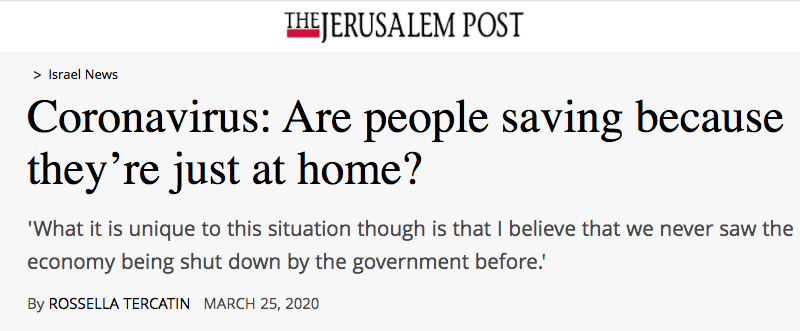

Israeli households on average spend NIS 2,000 to NIS 3,000 a month on education, culture and entertainment, NIS 600 to NIS 700 on clothing and footwear and NIS 3,300 to NIS 6,400 on transportation and communications, according to the most recent data by the Central Bureau of Statistics.
With the increasing restrictive measures imposed by the government to contain the coronavirus outbreak and people confined at home, more than 600,000 Israelis have lost their jobs or been put on unpaid leave. For them and for the rest of the country, can the lockdown present an opportunity to save on regular expenses such as the ones detailed above? Not so fast, experts warn.
“When consumers experience uncertainty regarding their income, it is normal for them to cut back on nonessential expenses,” Prof. Ori Heffetz of the Hebrew University of Jerusalem and Cornell University told The Jerusalem Post. “In this sense, the coronavirus emergency is not especially different from other circumstances where consumer confidence decreases.”

“What it is unique about this situation, though, is that I believe that we never saw the economy being shut down by the government before,” he said.
This means that many people are experiencing a reduction of their income, while those whose income is not affected cannot spend, and this creates a problem, Heffetz said.
“If on the one hand, by spending less my savings go up, on the other hand, this means that someone is going out of business,” he said.
“In times like this, therefore, the question is what happens faster: the increase in savings or the decrease in income,” Heffetz said. “And by the way, most of the savings in the economy is by high-income households, while the first ones to lose their jobs are people from the lower income households.
“They never save much, and now they will save even less. But because the high-income households save more, the saving rate might go up.”
Regardless of whether people maintain their salaries or not, families with a lower level of income spend a greater percentage of their earnings on essential items such as food and housing, and these expenses do not decrease in a lockdown. On the contrary, shutting down malls, beauty salons and restaurants or restricting travel significantly reduces important expenses for stronger earners.
For those who find themselves facing a decrease in their income, some advice is offered by financial consultant and lecturer Rifka Lebowitz, who started the 28,000-member Facebook group Living Financially Smarter in Israel. She recently devoted a section of her website to how to deal with the coronavirus crisis.
“People should make an assessment of their resources before panicking,” she told the Post. “There are many expenses that are really decreasing, for example, gasoline or extracurricular activities for the children. For this reason, the gap to bridge between the contraction of their income and their needs might be smaller than what they think.”
“Moreover, people should keep in mind that this situation won’t go on forever,” Lebowitz said. “So they should make smart choices. For example, since this is a short-term problem, it’s better to solve it with a short-term solution.
“For example, instead of delaying paying your mortgage, which will mean that you will pay a little more over the next 20 years, you can hopefully pay back a larger overdraft within a few months.”
Heffetz said the crisis likely will have a long-term effect on people’s finances and behavior, but it is hard to know exactly what it will be.
“A few years ago, a group of economists from Berkeley and Michigan University highlighted that among central bankers, those who grew up during the Great Depression tended to be more aggressive in the fight against unemployment, while those who grew up in the 1970s experienced inflation as the biggest concern, even though they all studied in the same schools and looked at the same data,” he said.
“We are all like them. All of the sudden, we discovered that something we never imagined can happen and it kills,” he added. “Will this mean that we save more? Will we be willing to pay for a better health insurance? Will the government switch money from the national budget from the military to the health system because we realized that we could die not only in the war against terrorism but also in the war against a virus?”
“I truly hope this will not be the case, but I think that this might be one of those crises that becomes a national scar,” Heffetz said.